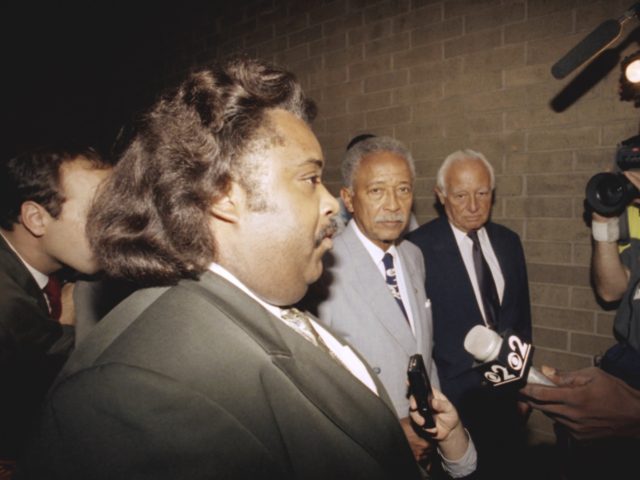Religious Jews are marking the 30th anniversary of the Crown Heights riots in Brooklyn, New York, in which Al Sharpton led marches through a Jewish neighborhood during one of the worst outbreaks of antisemitic violence in U.S. history.
The riots began after an accident in which a car in the motorcade of a Jewish leader, Rabbi Menachem Mendel Schneerson, known as the Lubavitcher Rebbe, swerved to avoid another vehicle and struck and killed a black child, Gavin Cato.
A false rumor was spread, alleging that an ambulance operated by religious Jews had failed to help Cato. “At the scene, descriptions of the accident swept through the crowd. Some youths in the crowd said they had heard from other youths that the three Hasidic men had received medical treatment before the two youths,” the New York Times reported at the time.
What resulted was a riot in which enraged black residents targeted the religious Jewish community and the police:
More than 100 police officers, some in riot helmets, surrounded the accident scene as more than 250 neighborhood residents, mostly black teen-agers shouting “Jews! Jews! Jews!” jeered the driver of the car, a Hasidic man, and then turned their anger on the police.
Some youths threw bottles and set a Yeshiva van on fire, the police said. A 17-year-old fired a gun at a police officer, without hitting him, and another youth drove his car at a group of officers but did not injure them, the police said. Both youths were arrrested.
The police set up barricades at several nearby intersections as youths continued to roam the neighborhood. At 11:30 P.M., three blocks from the accident, a group of youths stopped a car and stabbed the driver, another Hasidic man, the police said.
The man referred to above was Yankel Rosenbaum, a visiting religious student from Australia. Sharpton, who had soon joined in the protests, leading hundreds of marchers through religious Jewish neighborhoods on the Jewish Sabbath.
As National Public Radio has reported:
In a eulogy at the boy’s funeral, Sharpton criticized Jewish merchants in Crown Heights for selling diamonds from apartheid South Africa. He also said: “All we want to say is what Jesus said: If you offend one of these little ones, you got to pay for it. No compromise, no meetings, no coffee klatch, no skinnin’ and grinnin’.” Among the banners hanging to commemorate the boy, one read “Hitler did not do the job.”
Many Jewish leaders and others say Sharpton incited the violence or at least perpetuated hostilities. They disapproved of his decision to hold the march on the Jewish Sabbath. Some already had criticized him days before the riots for remarks he delivered at an unrelated rally in Harlem: “If the Jews want to get it on, tell them to pin their yarmulkes back and come over to my house.”
Sharpton, who visited Israel in 2001, admitted in 2019: “Our language and tone sometimes exacerbated tensions and played to the extremists rather than raising the issue of the value of this young man whom we were so concerned about.”
But as the religious Jewish website, Chabad.org, noted this week, Sharpton stopped short of apologizing. He had, earlier, justified his actions:
Writing in his autobiography five years after the riot, Al Sharpton, whose incendiary rhetoric during the event helped perpetuate the violence and who has never expressed regret for his incitement during the rampage, described the Jewish community of Crown Heights as a “Fort Apache in the black ghetto, [and] a hot-and-cold irritant to their neighbors.” The implication of these words was clear: it was true that Crown Heights had once been a Jewish neighborhood, but that was all in the distant past. How dare they remain once circumstances had altered the neighborhood’s makeup?
As Chabad.org noted, religious Jews had stayed in Crown Heights because the Lubavitcher Rebbe had advised against the flight to the suburbs, common among many American cities at the time.
This year, a renewed wave of antisemitic violence swept America in the wake of Palestinian terrorists’ attack on the State of Israel with thousands of rockets.
And Sharpton, far from being held accountable for his past rhetoric and behavior, has become a kingmaker in the Democratic Party and a fixture on left-wing MSNBC.
Joel B. Pollak is Senior Editor-at-Large at Breitbart News and the host of Breitbart News Sunday on Sirius XM Patriot on Sunday evenings from 7 p.m. to 10 p.m. ET (4 p.m. to 7 p.m. PT). He is the author of the recent e-book, Neither Free nor Fair: The 2020 U.S. Presidential Election. His recent book, RED NOVEMBER, tells the story of the 2020 Democratic presidential primary from a conservative perspective. He is a winner of the 2018 Robert Novak Journalism Alumni Fellowship. Follow him on Twitter at @joelpollak.

COMMENTS
Please let us know if you're having issues with commenting.